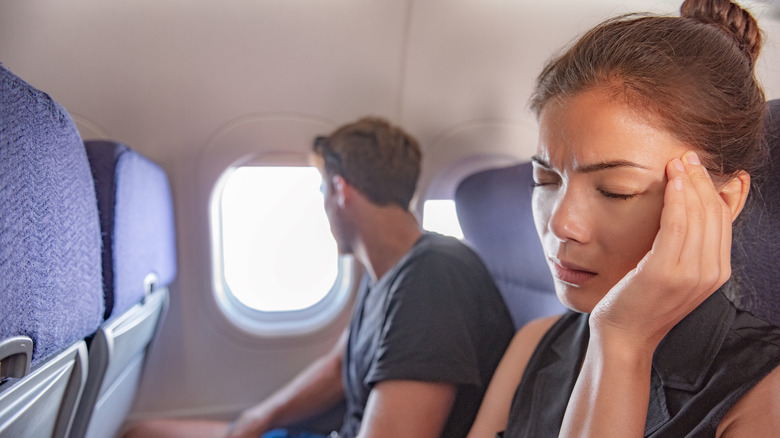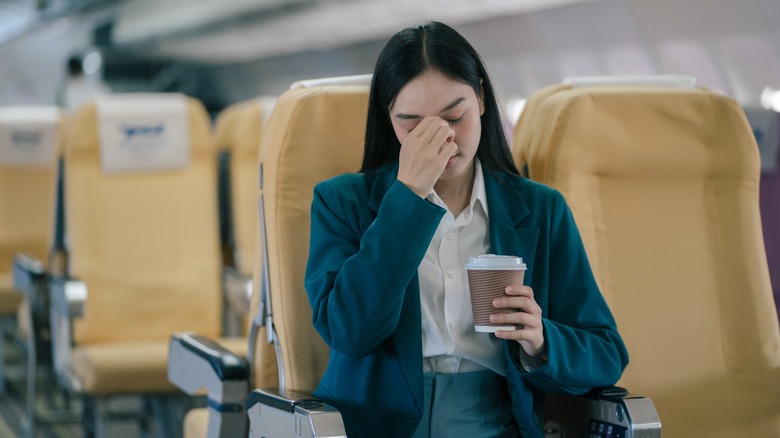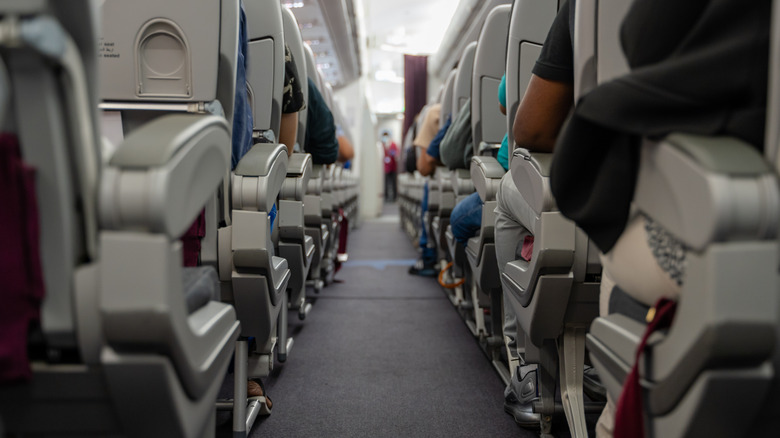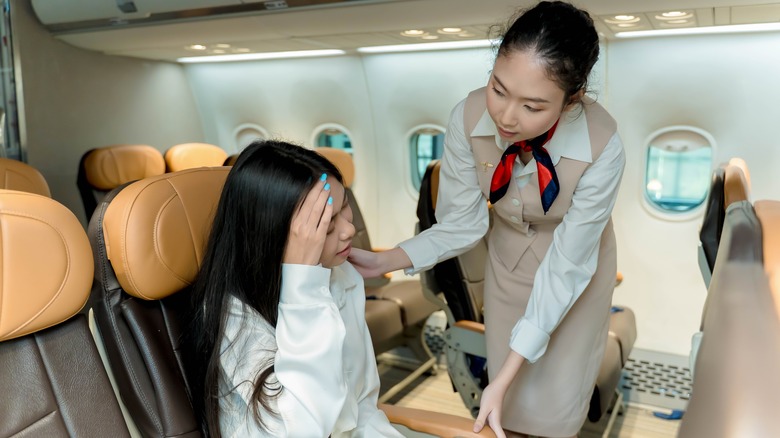Smelling 'Dirty Socks' On An Airplane Can Be A Dangerous Sign Of This Serious Health Risk
If you spend enough time on airplanes, you're almost certainly destined to encounter some gross smells. Most are harmless, but a "dirty sock" smell could mean you're in danger. This odor on an airplane could actually be a sign of toxic fumes entering the cabin from the plane's engine. Breathing in toxic fumes is a serious vacation health hazard for everyone on board.
Not all travelers have the best personal hygiene, so you may occasionally get stuck next to someone with unpleasant body odor. Perhaps they had a long overnight flight from overseas and they're on their last leg before returning home to a blissful shower and a good night of sleep. You might be sitting next to a baby who requires a diaper change, or someone who decides to pack a tuna salad sandwich for their inflight snack. If you're a compassionate traveler, you've probably learned to ignore the yucky smells caused by other people on your plane, but if you're smelling dirty socks you should let a flight attendant know right away.
Toxic fumes make headlines around the world
Boarding an airplane can often feel like a sensory overload. There are so many loud noises, bright lights, and stinky smells. It's tempting to simply put on noise cancelling headphones, a sleep mask, and zone out for the duration of your flight. But if you smell a pungent odor resembling dirty socks, it could be a more serious issue than your neighbor simply kicking off their sneakers — a controversial passenger behavior.
Air inside the cabin of a passenger aircraft is pumped in from outside. Before it reaches the cabin, it is circulated through the airplane's engine where it is heated and pressurized. This process makes it safe to breathe at high altitudes — usually. If an airplane engine seal is leaking, chemicals can be pumped in with the air. Oil and hydraulic fluid can result in a scent that reminds you of an old locker room. That "dirty socks" smell is an indication that chemicals from the airplane's engine are leaking into the cabin air system.
According to Forbes, there have been thousands of reported fume events on passenger airplanes since 2010. The "dirty socks" smell has been linked to medical emergencies amongst crew members and passengers. Symptoms include nervous system issues, headaches, nausea, and confusion. One flight attendant likened the experience to being drugged in an interview with the Wall Street Journal. She was rushed to the hospital when the flight landed but her symptoms got worse over months, and she was eventually left with a traumatic brain injury and life-long nerve damage. There have been reports of instances on Boeing and Airbus aircraft, but the Airbus A320 planes seem to have issues most frequently.
A firsthand account of the 'dirty socks' smell
Some experts argue that the FAA is taking too long to address the fume issues on commercial aircraft, but some airlines take the problem very seriously. Before I transitioned to writing full time, I worked for seven years as a flight attendant in the United States. If anyone claimed to smell "dirty socks" on our flights the plane would not be allowed to take off until the cause of the order was investigated. I only encountered the issue once, and that was more than enough.
We were on our final descent and I was in the back of the aircraft, buckled into my jump seat when the smell hit my nostrils. It reminded me of my boyfriend's old gym bag. It wasn't overpowering, but I'd received dozens of emails about what to look out for, so I quickly identified it as the dreaded "dirty sock" fumes. I reported it per the airline's procedure and the plane was grounded for the night so maintenance could investigate.
I remember feeling a little "slap happy" and kind of nauseous at the time, but I refused the airline's suggestion to get checked out by a medical professional. It had been a long day and I was ready to go straight to bed. A few hours later I woke up with severe nausea. As I stumbled to the bathroom, my vision began to blur and I started seeing spots. An extreme headache followed. I went to the ER, but several hours had passed and the doctor said there was no way to test my blood to see if my symptoms were related to the fume event.
What to do if you encounter the 'dirty socks' smell on your flight
If you think you smell dirty socks, locker room, or old gym bags on your flight you should let a member of the crew know immediately. Flight attendants and pilots are trained to identify toxic fumes, and they should take your complaint quite seriously. If members of the crew think there is a chance it could be fumes, maintenance will likely have to take a look at the aircraft. Don't be surprised if your flight is delayed or if you have to deplane and switch aircraft. An annoying but potentially life-saving outcome.
Keep in mind that during a fume event there may not be any visible problems. You probably won't see a haze in the air or anything resembling smoke — though that has occurred in some instances. The fumes are typically invisible, but trust your sense of smell and your instinct. If you start to feel sick while smelling "dirty socks" that's a clear indication that you could be dealing with toxic fumes and you should report it to the flight attendant. Especially if you begin to have any symptoms — even after landing — like stomach aches, dizziness, fatigue, muscle cramps, or confusion, document them right away and seek medical attention. Travel has bizarre effects on the human body, so it could be nothing to worry about — but it's always better to be safe than sorry.
Be your own advocate and encourage any other passengers who are having symptoms to do the same. Do your best to describe exactly what happened to medical personnel and airline staff members as they will likely need to file official reports.



